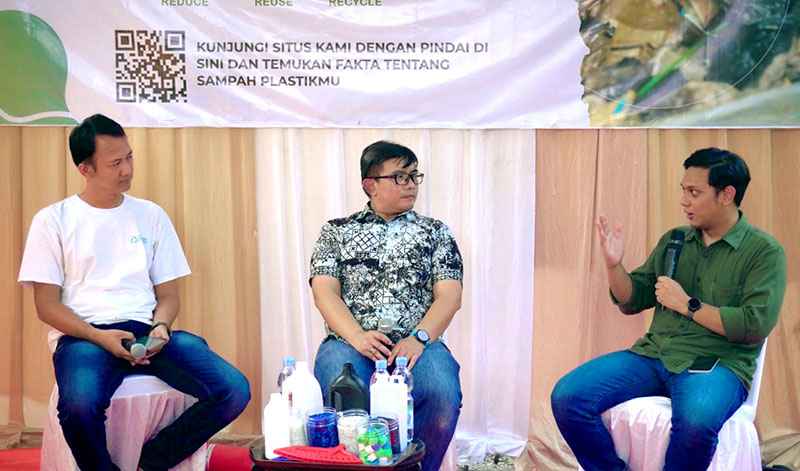
Bekasi, 14 June 2023 – Waste management is one of the main challenges faced by Indonesia. Along with population growth and rapid urbanization, waste production continues to increase significantly, where according to the Indonesian Ministry of Environment and Forestry, an average person in Indonesia contributes 0.7 kg of waste per day and some of it ends up in landfills.
According to data from Sustainable Waste Indonesia (SWI), only 7% of the 65 million tonnes of waste in Indonesia has been successfully recycled and 69% ends up in landfill. Currently, landfills in Indonesia are starting to be overwhelmed in managing the incoming waste. Evaluating from the comparison of the types of organic and non-organic waste that goes into landfills, it is considered unbalanced so that the waste starts piling up. This happens because a lot of waste that goes to the landfill is not first reduced through the recycling process.
There have been many efforts made by various institutions in order to reduce waste ending up in landfills, starting from education and socialization institutions to recycling institutions. Advocacy, education and socialization programs for recycling plastic waste Yok Yok Ayok Daur Ulang! (in English: LDRP!) has been one of those who have been present since 2019 to collaborate with various parties and intensify education and socialization activities on plastic waste recycling.
"In the beginning, this program (LDRP!) was initiated because of the many people's perceptions that environmentally friendly products are products that can be decomposed naturally, where in fact determining whether a product is environmentally friendly needs to be reviewed thoroughly from the beginning of production to its life cycle. Apart from that, waste management that still relies on landfills without processing it first is also one of our concerns," explained Hanggara Sukandar, Director of Environment & Sustainability Affairs Responsible Care® Indonesia.
In accordance with its purpose, the LDRP! promote collaboration in the process of education and socialization. On this occasion, the LDRP! collaborating with Kita Olah Indonesia, an institution with a specialty in waste management and recycling located in Bekasi City. Operating since 2021, Kita Olah Indonesia has taken part in processing waste circulating in society.
"Since it is formed, we have attempted to process approximately 900 tons of non-organic waste each year and about 3 tons per day, especially plastic waste, in various types, ranging from high value plastic waste such as HDPE, LDPE, PET and also PS which are fully recyclable to the ones that considered as residual such as multilayer," said Muhamad Andriansyah, Founder & CEO of Kita Olah Indonesia.
Kita Olah Indonesia has recycled plastic waste, ranging from high-value plastic waste such as used shampoo bottles, medical waste such as used infuse bottles, to gallons of mineral water and its lids. The process commonly carried out by Kita Olah is to separate plastic waste based on its type and color. After sorting, the plastic waste will be chopped into flakes through a cutting machine which will then be melted down and cooled to become the raw material or plastic pallets.
“The process is certainly not as beautiful as imagined. Much of the waste we receive is still dirty, especially bottled waste which still contains its contents such as ready-to-drink bottles. So the initial process is to clean it first before sorting it based on color," explained Andre.
Public awareness to clean and sort their waste before it is transported to the processing site needs to be continuously improved. This is expected to complete the stages of recycling activities and reduce waste that ends up in landfills.
"After being recycled into raw materials, these plastic pallets can be used by home industry manufacturers to be re-printed and formed into new products. The raw recycled materials that we produce have been used to make household products, such as broomsticks," said Andre.
Education and socialization of plastic waste recycling need to be continuously carried out to raise awareness of each level of society in carrying out their respective roles.
"Waste recycling activities cannot be carried out only by one party, but a penta-helix collaboration that involves various parties, ranging from the public or community, academics, government, businesses, to the media. Thus, the acceleration of recycling activities can be continuously increased in order to realize a circular economy that can be felt by all parties," Hanggara concluded.